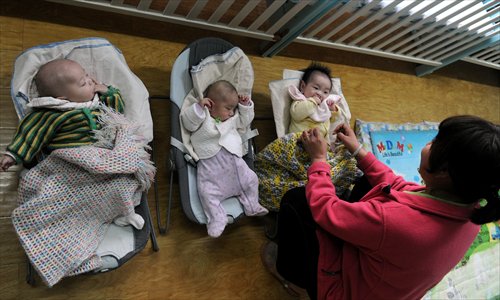HOME >> CHINA
Escape hatch
Source:Xinhua-Global Times Published: 2014-2-18 20:53:01

A staff member from a welfare house in Zhengzhou, Henan Province, takes care of three infants abandoned in a baby hatch in December 2013. Photo: CFP
Just two weeks after the first "baby hatch" was established in Guangzhou, South China's Guangdong Province, late January, it had collected nearly 80 abandoned infants.
A baby hatch is a place where people can safely and anonymously abandon an infant. Although abandoning a baby is illegal, the hatches were established to ensure the safety of the babies. The overwhelming majority of abandoned infants are disabled in some way.
Each hatch consists of an incubator, a delayed alarm device, an air conditioner and a baby bed. A person can place the baby in the hatch, press the alarm button, and leave. Staff at welfare organisations retrieve the baby five to 10 minutes later.
The Guangzhou case has sparked public discussion, and more baby hatches are set to be established in China.
However, experts say simply saving abandoned infants is not enough, and a better system is needed to protect the rights of children with illnesses and disabilities.
Hatching a plan
A total of 25 baby hatches have been established in 10 provincial regions in China, and more will be set up in another 18 regions, according to the China Center for Children's Welfare and Adoption (CCCWA).
The first baby hatch in China was set up in June 2011 in Shijiazhuang, the capital city of North China's Hebei Province.
The hatches have received widespread endorsement and been hailed as a sign of social progress and a way to help save the lives of abandoned babies. However, critics believe baby hatches encourage people to abandon their unwanted children, which is prohibited by law and can result in up to five years' imprisonment.
Li Bo, the head of the CCCWA, said people should view baby hatches rationally. Their purpose is to protect abandoned babies and conform to laws safeguarding abandoned infants' rights to life by prohibiting the dumping of unwanted children.
"Laws emphasize prevention, while baby hatches focus on rescue after the laws are broken," added Li.
Li said there is no proof that baby hatches have triggered an increase in abandoned babies. The Shijiazhuang social welfare institution received 105 infants in 2009 and 83 in 2010. Since the baby hatch was set up in June 2011, it has received 181 abandoned children.
In addition, the survival rate of abandoned babies has increased with the introduction of baby hatches. Taking the baby hatch in Shijiazhuang as an example, Han Jinhong, the head of the city's social welfare institution, said only one-third of abandoned babies survived before, but now the death rate has fallen sharply with the help of the baby hatch.
"Although we cannot change the abandonment of babies, we can change the results after they are dumped," added Han.
Insufficient welfare
Experts say the situation reveals the poor state of children's welfare in the country, as most abandoned infants have severe or difficult-to-treat diseases.
Xu Jiu, head of the Guangzhou Social Welfare Institution, said that 79 babies were received in the first 15 days after a baby hatch was set up in the city on January 28. Most of them were younger than one year old.
Some of the babies were covered in medical tubing, and some had hospital records tucked in their clothes indicating their severe illnesses or disabilities, such as Down syndrome or cerebral palsy. Most of the parents left brief notes or cash along with the infants indicating that they had no choice but to abandon their children.
According to Ji Gang, a staff member of the CCCWA, 99 percent of babies left at hatches have illnesses or disabilities. Their parents are afraid of becoming impoverished as they cannot afford the expensive medical bills and fees for special education.
"It shows the lack of welfare for children," said Ji, who added that the government should take into consideration the comprehensive welfare of children with physical or intellectual disabilities, including medical treatment, care and rehabilitation.
China doesn't have a specific national healthcare insurance system for children and many local-level systems can only cover expenses for basic medical services, the Guangzhou Daily reported. The newspaper also noted that the current healthcare insurance system provides services depending on the location of people's household registration, or hukou, which prevents access to medical care for the children of many migrant workers.
Only with a sustainable system and government assistance can the government address parents' concerns and reduce the number of abandoned children, Ji said.
Improved welfare needed
Baby hatches provide basic protection for abandoned infants, but they are only the first step in caring for abandoned babies given the incomplete system for children's welfare, said Tong Lihua, head of a Beijing legal aid and study center for adolescents.
Tong added that children are not only the responsibility of the parents but also of society and the State, so the government should help parents in protecting and raising children.
Li said a medical insurance system for children with major illnesses should be established, while related systems to help children with major illnesses and disabilities should be improved.
In the meantime, Li called for strengthened guidance and checks during pregnancy so as to lower the birth defect rate.
Tong said China should study other countries' laws on protecting children's rights and build its own system to protect minors while taking into account China's realities.
The Ministry of Civil Affairs is now studying a welfare system to support families of children with illness or disabilities. The system would subsidize those families and reduce their taxes in order to prevent them from abandoning their children.
Posted in: Society